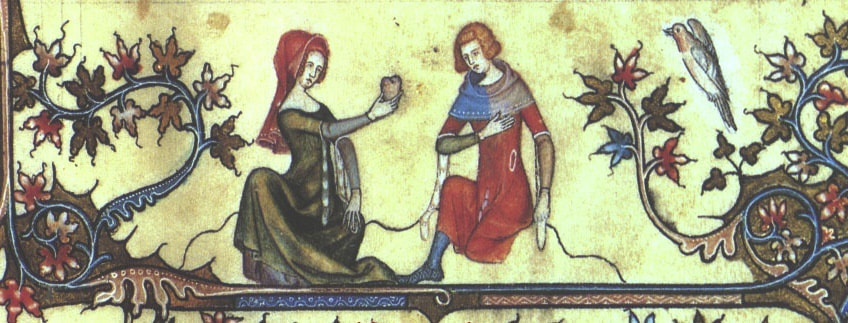
Barbara Allen is a folk song of the no-one-knows-who-wrote-it-or-even-when variety. The diarist Samuel Pepys (yup, he is best known for having written a diary. This is important because he lived from 1633-1703 in London.) mentions having heard the song sung at a party on 2 January 1666. The song appears to have been well-known at the time.
In Scarlet town, where I was born,
There was a fair maid dwellin’,
Made every youth cry Well-a-way!
Her name was Barbara Allen.
All in the merry month of May,
When green buds they were swellin’,
Young Jemmy Grove on his death-bed lay,
For love of Barbara Allen.
He sent his man in to her then,
To the place where she was dwellin’;
“O haste and come to my master dear,
If your name be Barbara Allen.”
So slowly, slowly rose she up,
And slowly she came nigh him,
And when she drew the curtain by--
“Young man, I think you’re dyin’.”
“O dinna ye mind, young man,” says she,
“When the red wine ye were fillin’,
That ye made the healths go round and round,
And slighted Barbara Allen?”
He turned his face unto the wall,
And death was with him dealin’:
“Adieu, adieu, my dear friends all,
And be kind to Barbara Allen!”
As she was walking o’er the fields,
She heard the dead-bell knellin’;
And every blow the dead-bell gave
Cried “Woe to Barbara Allen.”
“O mother, mother, make my bed,
O make it saft and narrow:
My love has died for me today,
I’ll die for him tomorrow.”
They buried him in the old churchyard,
They buried her beside him.
And out his grave grew a red- red rose
And out of hers a briar
They grew and grew in the old churchyard;
Till they could grow no higher.
They lapped and tied in a true love’s knot,
The red rose and the briar.
While many places are given in the first verse for where the song takes place, Scarlet town is the one that I learned. It is generally considered that Scarlet is a joke on the town of Reading (pronounced Red-ing.) While the music that I owned of this song is long, long gone, I’ve tried to give you the version that I used to sing.
As with other folk songs of this type, there are as many versions as there are people who sing it. We know that it goes back at least as far as 1666. The American historian B.H. Bronson said “This little song of a spineless lover who gives up the ghost without a struggle, and his spirited beloved who repents too late, has paradoxically shown a stronger will to live than perhaps any other ballad in the canon. It is still universally known.” Bronson found 198 versions of Barbara Allen. (198! It’s a shame he couldn’t find two more.) There are still people recording this song.
Dark of the Moon
Barbara Allen has made it into a few movies as background music, but it was (sort of, somehow) made into a play entitled Dark of the Moon. But the plot gets a little out there. We have witches, magic, and a ritualized rape. Apparently, the play was written in 1942 at the University of Iowa, possibly in response to an unspecified bad folk play of the time.
When I was in college, we did Dark of the Moon. I remember it as being a lot of fun, if more than a little weird. I remember all of the cast being upset that the rape got laughs. We all found it disturbing.
Ok, briefly, here’s the plot. There is a witch-boy, and he falls in love with Barbara Allen. He goes to the Conjur Man and asks to be made human so that he can marry Barbara. The Conjur Man refuses, but the Conjur Woman agrees, but like Cinderella’s fairy godmother, gives some conditions. Barbara has to remain faithful to him for a year, or he will return to being a witch.
John (our witch-boy is now called John) meets the fair Barbara and asks her to marry him. She says yes, but there is already a problem. Since he isn’t quite human, John cannot enter the church, so they are wed outside.
Time passes. There is conflict with the local villagers, especially with Barbara’s ex. Barbara gets pregnant, and gives birth to a demon-baby, which is still-born and then burned.
We make it to the last night before the year is up, and Barbara is dragged off to church, where her ex-boyfriend tells everyone that God has told him that his lusting for Barbara is not a sin, and that the only way to save her soul is for him to take her. So, while the churchgoers watch, Barbara is raped.
This breaks the agreement with the Conjur Woman, and as Barbara dies, John returns to being a witch. The end.
Barbara Allen and Witches?!?
During rehearsals for Dark of the Moon, I researched the song Barbara Allen. Davis and Elkins college (first college I attended) houses the Augusta Collection, an archive of Appalachian music and folk culture. In none of the versions of the ballad of Barbara Allen could I find any mention of witches.
Barbara Allen is an old-school folk song. No one knows who wrote it, when, or why. But is exists in Scotland, England, and the USA. It has been translated into French, and Italian.
Are you familiar with this song? Have you ever seen Dark of the Moon? I’ll be posting versions of Barbara Allen on my Minnich Music FaceBook page this week, so be sure to check them out.
Until next time!
 RSS Feed
RSS Feed